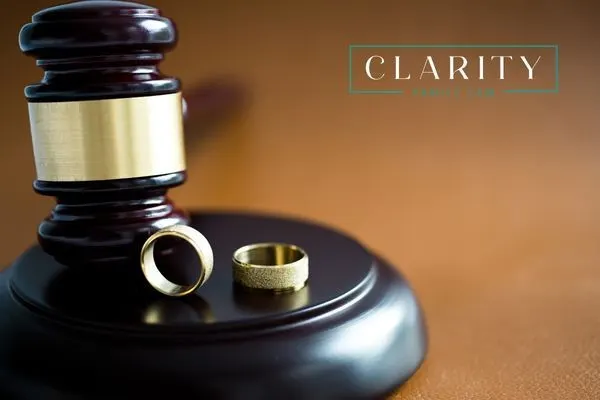Divorce can be daunting, but mediation offers a less stressful, collaborative option. Mediation in divorce is a voluntary, confidential process in which a neutral mediator assists couples in negotiating a settlement. It enables you to control the outcome, avoiding court-made decisions. The aim is to achieve a fair, sustainable resolution without a trial.
During a mediation session, the mediator acts as a facilitator, not a judge. They don’t make decisions or take sides. Their role is to guide the conversation, clarify points of disagreement, and help you explore mutually beneficial solutions. Mediation is often a more cost-effective and less adversarial approach than traditional litigation. If you’re considering this path, it’s crucial to understand the mediation process and what to expect.
Ready to learn more about how mediation can help you and your family? Keep reading to explore the key benefits and steps involved in this valuable alternative dispute resolution method.

Call Clarity Law Firm at 313-513-1919 today to speak with our skilled Dearborn divorce attorneys and schedule a free consultation!
Why Choose Mediation for Your Divorce?
Mediation offers several key advantages over going to court. For many couples, it’s a way to preserve a civil relationship, which is especially important if you have minor children. It fosters open communication and encourages creative problem-solving.
Unlike a court hearing in a contested divorce, where decisions are made for you, mediation empowers you to craft a divorce settlement agreement that fits your unique family needs. This level of control can lead to a more durable and lasting resolution. Another significant benefit is confidentiality. Discussions during mediation are private, and anything said cannot be used against you in a future court process should mediation fail. This privacy allows couples to speak more openly and honestly about their concerns.
The Mediation Process: Step by Step
The mediation process is structured to guide couples systematically toward a resolution. Here’s a breakdown of what you can expect:
- Initial Intake: It starts with a questionnaire to collect details about your case, followed by signing a mediation agreement, which sets rules like confidentiality and voluntary participation.
- Mediation Sessions: The mediator will arrange sessions to address key divorce issues like child custody, parenting plans, child support, and property division, ensuring both parties are heard.
- Joint and Separate Meetings: Mediators often hold joint sessions with both partners and private caucuses for individual discussions. These are useful for sensitive topics or when one party prefers a one-on-one setting.
- Drafting the Memorandum of Understanding (MOU): After resolving disputes, the mediator creates a memorandum of understanding (MOU) summarizing decisions. Though not legally binding, the MOU guides attorneys in drafting the final enforceable documents, like the separation agreement and divorce complaint.
The Role of Attorneys in Divorce Mediation
While mediation can be done without a lawyer present, it is strongly recommended that both parties seek independent legal advice throughout the process. A family law attorney can provide crucial guidance, ensuring that any proposed settlement agreement is fair and protects your legal rights. Your attorney can review the memorandum of understanding and draft the legally binding documents.
In mediation, your attorney advises on legal matters instead of arguing your case. They help you grasp the long-term effects of your decisions. Consulting on specific issues like pension or asset division is possible. Legal help is crucial, and many mediators recommend it. Couples might get a mediation leaflet or legal aid resources for additional support.

Court-Appointed vs. Private Mediation Services
You can choose between court mediation services or a private mediator. Courts often require or encourage mediation before trial, known as court-ordered mediation. Court-appointed mediators might offer services at reduced cost or for free. Initial court appearances often include discussions about these alternatives.
On the other hand, a private mediator is an independent professional you hire directly. You have more control over the selection of the mediator and the scheduling of sessions. A private mediator might be a certified mediator, a member of an organization, or registered with the Family Mediation Council. While private mediation can be more expensive, it often offers greater flexibility and can lead to a faster resolution.
Regardless of the type of mediator, the process is largely the same. You may even receive a notice of appointment for mediation from the court or your mediator, detailing the next steps.
Addressing Complex Issues
One of the benefits of mediation is that it can handle even the most complex issues. For example, when crafting a parenting plan, mediators can help you address specifics like holiday schedules, educational decisions, and communication protocols. They are trained to handle sensitive topics related to child custody and create a plan that serves the best interests of your minor children.
Issues like property division can also be complex. The mediator can help you and your partner reach an agreement on how to divide real estate, retirement accounts, investments, and other assets. They can also help with debts and liabilities. In situations with high conflict or even the presence of a protective order, mediators are trained to handle these dynamics, sometimes even using separate rooms or phone mediation to ensure everyone’s safety and comfort.

The Final Steps: Reaching a Settlement
After all the issues are resolved and you have a solid memorandum of understanding, your respective attorneys will draft the final legal documents, including the divorce settlement agreements and a stipulation and order. Once signed, these are submitted to the court. The judge will review the documents to ensure they are fair and in the best interests of any children. If approved, the court issues a final decree on the petition for divorce.
The entire process, from first appearance to final decree, can be much faster and less emotionally draining through mediation. It is an excellent example of how alternative dispute resolution can be a more effective path for families navigating a divorce. For those who can’t afford a private attorney, exploring legal aide resources is a good starting point. Some may also consider family arbitration as a next step if mediation doesn’t fully resolve the matter.
Conclusion
Divorce doesn’t have to be a battle fought in court. Mediation gives you the opportunity to protect your family’s privacy, save time and money, and craft solutions that truly reflect your family’s needs. By keeping control in your hands rather than leaving decisions up to a judge, mediation can make this difficult transition smoother and less stressful for everyone involved.
If you’re considering mediation near Dearborn, the team at Clarity Law Firm is here to guide you every step of the way. Our dedicated divorce attorneys will help you understand your options, protect your rights, and ensure your settlement is fair and lasting. Call us today at 313-513-1919 to schedule your free consultation and take the first step toward a more peaceful resolution.
